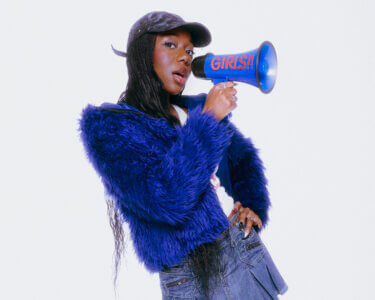Bully Engineer Their Emotions

Bully were immediately gripping when they came out the gate a couple years ago. Already grabbing ears with their raw sound, their single “Trying” propelled them to even more attention as they perfectly captured the sounds of the 90’s while saying something completely new in the process. Returning home after touring Feels Like they had to pick up the pieces of their lives again, which ended up fueling their new record Losing for better or for worse. We caught up with Bully’s Alicia Bognanno to talk about their post-tour life, how Bognanno’s degree is helping her now and how they pulled the screaming into their music.
Northern Transmissions: Looking at the singles so far, there’s a noticeably more frantic and immediate sound to the music, do you think this has to do with the more chaotic state of things you returned to after your last tour?
Alicia Bognanno: It puts you in a weird place when you’re used to performing every night. You have to learn to be stationary again, and learn different ways at home to work out those feelings. You have an awesome creative outlet for any negative energy you have. A lot of that came through on the record because it was a little bit of a shock to pull the plug on touring until we wrapped up our work on the second record. We’re all really excited to get back on the road.
NT: I know you’re fairly involved in causes like gun control so I was curious how you guys got involved with Our First 100 Days to release “Right”? Was this just a song you’d been kicking around or was it inspired by Donald Trump himself?
AB: We were asked to be involved in the project after we had recorded the song, so that song isn’t about the election. I know when they approached us, they didn’t necessarily just want songs that were directly responding to the election, but songs that could sell so they could donate money to causes that were jeopardized by Trump being in office. It wasn’t really a directly political song.
NT: Were there any particular tricks you learned from studying audio recording and working in the field (particularly at Steve Albini’s Electrical Audio), that have helped you flesh out Bully’s sound?
AB: The one thing that comes to mind, it’s not necessarily our sound but more with how we use our studio time. I definitely picked up on how prepared you should be before you get to the studio, when I was interning and working. It takes so much unnecessary stress away by having your shit together before you go in to track. The moment you get there, you’re on the clock. I think working out the details, and if you can demo the songs ahead of time, you can hear if something stands out or sounds weird. It was something I noticed off the bat, it eliminates a lot of stress.
NT: I also understand that your first album was also the first time you’d done an album of that scale as an engineer, so how was the experience this time?
AB: There’s definitely little things, and I already feel this way about the new record too. Every time you track a song, if you’re in the engineering room there’s always something you want to do differently the next time around. The first time we went in to track, I used a bunch of room mics for drums and vocals, I was excited to have that luxury to use all these mics in a rooms that sounds great. Going in this time, I wanted to take it a little easier than we did on the first record. It’s more direct than the first record. I had mics like the 4038s and M380s I was sure to stick to and use, but there’s always additions like different pre-amps and things that you change up.
NT: Was there something in particular that lead you to self-produce or was it just a matter of time and funds?
AB: For engineering, I have a Bachelor’s Degree in Audio Engineering, and I want to make sure I’m using that, not just dropping that because I’m on the road. I also just like doing it myself instead of having to explain it to someone else just to get what I want. It’s not easier but I think not having that dialogue is easier. For producing, I haven’t really had the desire to have someone come in, this is only our second record. We’re not at the point where we want to bring someone into this close and intimate thing. Sometimes you want a new direction or fresh set of ears but we’re not there. I don’t know who we would bring in, it’s such a personal thing so you just kind of wait for that person.
NT: What pulled you back to your old stomping grounds at Electrical Audio studios and did any of your old coworkers come in on the process?
AB: They have the same staff of about 5 or 6 people, so there was a bunch of familiar faces. We went back there though because we’re familiar with the studio, I’m familiar with the console and they have a tape machine. It was also just a great price compared to a lot of Nashville studios. In general just gear-wise, their microphones, machines and all the gear we wanted was there, and we did it analog. It was an easy answer for us.
NT: You have a pretty uniquely strong and equally raspy cutting voice, was this just how you naturally sang or was this a style that developed as you wrote with the band?
AB: It just came out in the song writing, it wasn’t anything that I set out to do. I always think of when we first started playing “Trying” live. It sounds funny, but a lot of it comes down to our practice spaces and how you can hardly hear your vocals. If there’s a lyric you’re singing or feel like you should scream, it just sort of happens. Sometimes when I’m polishing the melody it comes out, or it just happens live, it’s never something I’ve ever thought out when I’m writing a song. Touring with my voice hasn’t really been an issue, it does get to be harder in the winter. When we were tracking this record, we were in Chicago in January and February, and I was having a hard time. Usually when we’re on the road, my throat muscle-memory builds up a tolerance, it becomes more difficult when we have one-of shows and it becomes a shock.
Words by Owen Maxwell
Latest Reviews
Tracks
Advertisement
Looking for something new to listen to?
Sign up to our all-new newsletter for top-notch reviews, news, videos and playlists.









